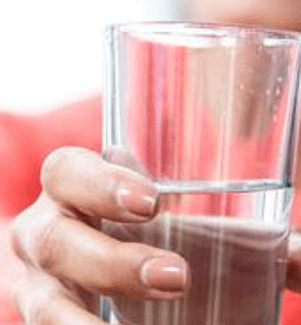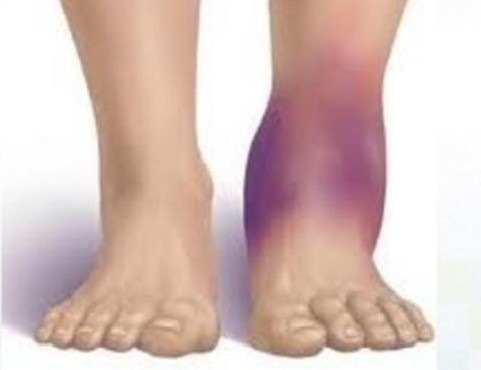
Water is essential to our life and well-being. The human body is made up of approximately 70-percent water. It only makes sense that our day-to-day bodily functions HELP protect and lubricate our joints, maintaining organ function, transporting oxygen to cells, pumping blood to muscles, and regulating our body temperature. Lots of times, we come up a bit short and our body will likely tell us about it. This is called Dehydration. Dehydration is a condition caused by the loss of too much fluid from the body. It happens when you are losing more fluids than you are taking in, and your body does not have enough fluids to work properly. Doctor’s biggest complaint with older people, especially over 50 years of age tend to be more Dehydrated! So, NOT getting enough “water / fluids” can lead to serious health consequences, taking a toll on our overall health, causing Dehydrated Health Risk! This is where older adult’s lives are changed, because they have a Dehydration Health Risk. Some older adults lose their sense of thirst, so they don’t drink enough fluids.
What are the symptoms of dehydration?
- Urine Appears Dark Yellow
Concentrated, dark yellow urine is one of the first signs of dehydration. Our kidneys control water balance and blood pressure and expels waste from our body. The kidneys attempt to store water instead of expelling it from the body. By drinking more water, you support normal kidney function, which increases the amount of urine that passes through your kidneys and flushes toxins from your body. Boosting your water intake also helps prevent the buildup of minerals that can cause kidney stones. Please beware and take notice of certain symptoms so “you” will not be one of these individuals with Dehydrated Health Risk!
- Prescription Medications
Drugs from the pharmacy are aimed at improving your health, and they often achieve that goal. However, there are several side effects possible—and one of them is dehydration, notes Health.com. This is because many prescription meds are also diuretics, meaning you’ll have to urinate more often. The increased passing of urine will deplete your water supply, so you should check the label to see if excess peeing is a side effect of your prescription. Blood pressure meds are commonly associated with this problem, notes the site. https://www.activebeat.com/diet-nutrition/the-top-10-signs-of-dehydration
- Constipation
For healthy bowel movements – Water absorption is critical for effective digestion. WATER in your body – Keeps things Moving along, helping the food you eat move more smoothly along your intestines and out of the body with good bowel movements. It’s all about keeping your digestive system functioning normally. Water also keeps the intestinal walls smooth and malleable. That’s why when we’re dehydrated, the colon can become less flexible, contract slower, absorb less water, and result in stool (or body waste) that’s hard, dry, and painful to pass. Lack of good bowel movements can mean a buildup of toxins. Staying hydrated also helps to eliminate toxins from the body and dehydrated health risk.
- Headaches
Have a headache? Its still unclear why dehydration can cause a splitting headache? It might be because you’re dehydrated. Although not a proven theory. The most logical explanation behind it – is because our brain, nerves, and sinuses, which are all possible causes of headaches, rely on water as their fuel to properly function. Another explanation presented by Self magazine, is that headaches occur during dehydration because blood volume drops, which leads to a lack of oxygen to the brain. “This reduces the brain’s oxygen supply and causes the blood vessels to dilate, leading to headaches and even lightheadedness.”
This may shock you to know – according to November 29. 2018 Senior Health Magazine Article called – Drink Up: Dehydration is Often Overlooked Health Risk for Seniors, it states “Dehydration is a common cause of Hospitalization among “elderly” people.” https://health.clevelandclinic.org/drink-up-dehydration-is-an-often-overlooked-health-risk-for-seniors
- Loss of Cognitive Function
Lack of Water can influence the brain. If you feel less alert, having trouble focusing, confused, slow to react, in the beginning or middle of your day, that could be a sign you are Dehydrated. Dehydration can lead to low blood pressure, which results in a lack of oxygen flowing to the brain. “The brain requires almost 60 per cent of the body’s fluids for energy,” DuFour says. “If you’re not getting enough water or are even slightly dehydrated, that can affect cognitive function and concentration, causing issues with coordination, reaction times and confusion.” https://globalnews.ca/news/4309349/dehydration-not-enough-water-risks/. Dehydration can lead to low blood pressure, which results in a lack of oxygen flowing to the brain. The best cure for dehydration is to start drinking water, to avoid dehydrated health risk. The easiest way to tell if it’s working is to check the color of your urine. After loading up on liquids, the color should revert back to normal and become clear again. If drinking water doesn’t help ease the symptoms, then you should call your doctor right away.

- Inflammation in the Feet and Ankles / Joint Pain
- One thing that many people don’t realize is that dehydration can cause fluid retention. Dehydration can cause swollen ankles, feet, and legs. When your body is not hydrated enough, it holds onto the fluid it already has to make up for the lack of incoming water, thus contributing to swelling. Hence, swelling happens after being dehydrated. “Usually, individuals who suffer from heaviness and leg swelling make the mistake of not drinking enough water – says Dr. Marco Setti, Head of Vascular Surgery at Humanitas Gavazzeni. https://www.hunimed.eu/news/importance-drinking-water-treat-swollen-legs-feet/. Hence, swelling happens after being dehydrated. Protein and uric acid build up in the body, cause foot swelling, and can be washed out by proper hydration. As mentioned at the beginning, our bodies require proper hydration to function properly. This is especially true within the joint areas where water makes up the lubrication of joints and helps to flush out toxins in the area. If a person is dehydrated, their body will tend to pull water from the joint areas causing protein and uric acid build-up in the body. This can leave the joints depleted from water, which can result in both joint inflammation and pain.
- Wearing Compression Stockings or Socks – HELPS with Inflammation / Swelling of the legs. Compression Stockings are elasticized hosiery that promotes blood circulation by putting gradient pressure / gentle squeeze on the veins. Vein circulation socks improve the flow of blood back to the heart, reducing swelling, tiredness and aching of the legs and feet. You do not need a prescription to buy compression stockings or vein circulation socks. You can buy vein circulation socks online. We have Certified Fitting Specialist waiting to Help provide you with a proper fit and answer any questions you may have. Call us at 1-844-629-9642.
Stay as Hydrated as possible. Here are a few simple Tips to HELP:
- Start each day by drinking a tall glass of water when you get up in the morning.
- Keep a water bottle at your desk to sip throughout the day.
- Always drink a full glass of water before lunch and dinner.
- If you need a reminder, set a timer on your phone to send a notification when you need to drink.
- Try using a water-tracking app to measure how much water you are drinking each day.
- If you don’t like the taste of water, try adding a bit of flavor with a squeeze of lemon. Or you can buy low-calorie water enhancers to mix into your drink.
- Use a “straw.” Using a straw helps force the water to the mouth – for easy and more consumption.
At your convenience – read this recent article: Good Hydration Linked to Healthy Aging @ https://www.eurekalert.org/news-releases/975393 it states “Adults who stay well-hydrated appear to be healthier, develop fewer chronic conditions, such as heart and lung disease, and live longer than those who may not get sufficient fluids.” Using health data gathered from 11,255 adults over a 30-year period, researchers analyzed links between serum sodium levels – which go up when fluid intake goes down – and various indicators of health. They found that adults with serum sodium levels at the higher end of a normal range were more likely to develop chronic conditions and show signs of advanced biological aging than those with serum sodium levels in the medium ranges. Adults with higher levels were also more likely to die at a younger age. “The results suggest that proper hydration may slow down aging and prolong a disease-free life,” said Natalia Dmitrieva, Ph.D., a study author and researcher in the Laboratory of Cardiovascular Regenerative Medicine at the National Heart, Lung, and Blood Institute (NHLBI), part of NIH


